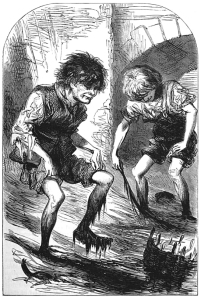Around 1929, two linguists dropped a theory that we are limited in our appreciation by our personal semantics. The two were Edward Sapir and Benjamin Whorf. This became the ‘Sapir-Whorf hypothesis’. Or Whorfianism.
So an Eskimo is alleged to have multiple words for ‘snow’. Oh, argue that amongst yourselves: I’ve had to sit through lectures on semantics and stuff; and have no intention of revisiting.
Then I went to the back-page, and Will Self’s column, in the current issue of The New European. Available at all good newsagents, and cheaper in Ireland than in the UK. Self claims to have spoken to an advanced shop-lifter, ripping off high-end shopping parks. And this is the core matter:
… in the old-style London criminal hierarchy … hoisters are pretty lowly creatures, even if they are stealing from high-end outlets. Up above them ascends a perverse pantheon of peculation, with kiters (passers of stolen cheques and other fraudulent financial instruments), fences, conmen and sundry other tea-leafs — all the way up too those ‘pavement artists’ also known as ‘the chaps’ or ‘the heavy mob’: those thieves inclined to enter banks or jewellers and at gunpoint relieve them of their cash and valuables. To be a celebrated ‘chap’ is to ascend to the paramount status and become a ‘face’.
Self says he learned that from his origins in Hampstead Garden Suburb.
His predecessor was Henry Mayhew. In London Labour and the London Poor Mayhew itemised in painstaking, even tedious detail:
the Condition and Earnings of Those that Will Work, Those that Cannot Work, and Those that Will Not Work.
 At the pits of Mayhew’s hierarchy would be the mudlarks, pre-teenagers picking through the slime and effluent of the Thames banks for anything with the slightest value.
At the pits of Mayhew’s hierarchy would be the mudlarks, pre-teenagers picking through the slime and effluent of the Thames banks for anything with the slightest value.
Down in the sewers were ‘toshers’, scavengers looking far valuables.
The ‘climbers’ were the (mainly, but not exclusively) boys climbing up and sweeping the inside of chimney flues.
At the start and end of working lives were the crossing sweepers, clearing paths through the mud and horse dung for ladies in crinoline skirts. The ‘dust’ they cleared would end up on “the Golden Dustman’, Noddy Boffin‘s dust-heaps behind King’s Cross. To understand that, we need to appreciate just how much horse-dropping fouled the streets of Victorian London (Lee Jackson estimates a thousand tons a day). Oh, and the ‘dust’ would be shipped up the Lee Valley to the market-gardens.
One more: ‘pure collectors’ — which must be the grossest euphemism of all. They hoiked up dog turds and delivered them to tanners, where the ‘material’ was used for dying and treating leather.
Above there I referred to Our Mutual Friend, Dickens’ longest, most complex of novels. It opens with Gaffer Hexam and his daughter Lizzie, rowing:
between Southwark bridge which is of iron, and London Bridge which is of stone, as an autumn evening was closing in.
Their search is for bodies.
When Dear Old Dad came back from the Second Unpleasantness, he was with Thames Division at Wapping. One of the river police’s tasks was bringing corpses, largely of suicides, to shore. He once recollected how, curiously, all those ended up on the north bank, because the coroner would pay a better honorarium.
There are probably Whorfianisms for all that.

I am not the only one to be an avid reader of Mayhew’s book: what astonishes and impresses me, is the sheer optimism of people in crushing circumstances. When in Victorian England, one was said to be ‘ruined’ that was exactly what happened” destroyed, utterly and completely. GBS was particularly contemptuous of lower middle class sensibilities, but for them, the world was a very dangerous place: those sensibilities were a code, drummed into offspring to enable them to survive. I am afraid I have always regarded GBS as a very stupid man.
Shaw sprang form Lower Synge Street, Dublin.
He made sure he sprang a long way.
While I like Shaw’s plays, there’s always an undercurrent of classism, perhaps even self-satirised through Bluntschli, the ‘chocolate cream soldier’ with ‘9,600 pairs of sheets and blankets’.